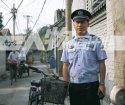And you can tell the two type of police by their uniforms. The blue shirts are called 片警, are usually not well trained in combat type situations, lightly armed or unarmed, form the majority of the police force. They do patrols, guard public places, help sort out neighborhood issues, write tickets and call for backup when things got serious. I don't think they actually have the authority to make arrest, since they tend to just hold people in their spot until their backups arrive. There tons of videos online of they acting out against them, while the police are more or less powerless until their backups arrive. There are running jokes about they have less combat power than chengguans, and there several case of blue shirt police beat up by chengguan when mediating disputes.
View attachment 9400
The other type is black uniformed 干警,would actually being through real police academy training and are armed with weapons. Would are the guys actually got to investigate criminal activities, serious issues that might turn violent, and backup 片警 when things turn serious. I think these guys are actually the equivalent to police in the west in terms training, equipment and authority. But when things are really serious, they will call the PAP for help.
View attachment 9401
View attachment 9402
As for PAP, it's the most heavily armed police units. And unlike regular police, it's not a lifetime career post but a service term of a few years similar to the military. They do have a branch for internal security, and most serves as backups and sharpshooters for the police units. They are makeup most of China's firefighting force as well as serve as guards of Tiananmen Square and surrounding government ministries.
View attachment 9403
View attachment 9404
Which the Kunming incidents, I think the blue shirts will eventually get phased out for providing security in public place. And have the more competent black uniformed police do the job. It's more expensive, and the will be boring for them, but it's necessary for sudden emergencies. Also have a PAP unit stationed in or near busy public places such as train stations would be a good idea. (They do that for Beijing, but I don't see it elsewhere.)
*note, it appears the uniform distinction between the two no long applies all the time. But the distinction in roles is still present.






